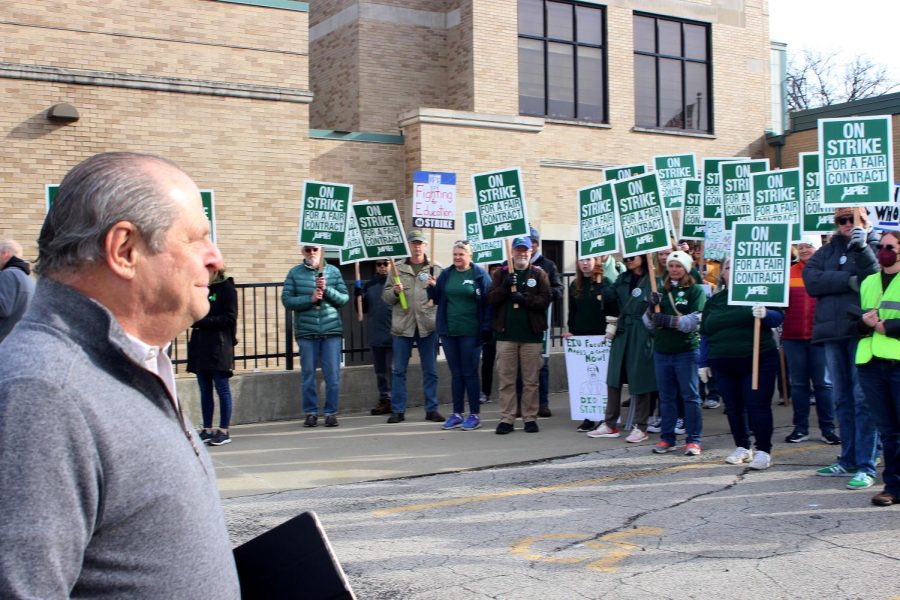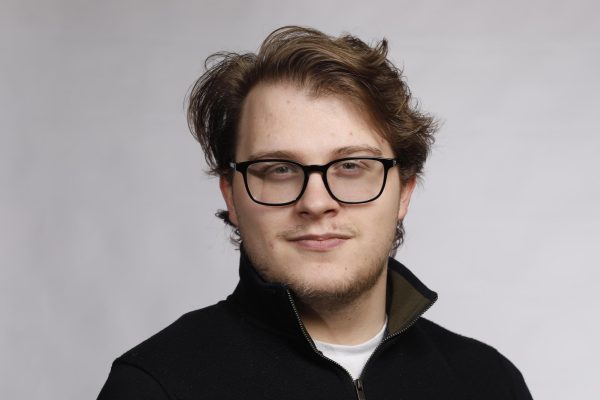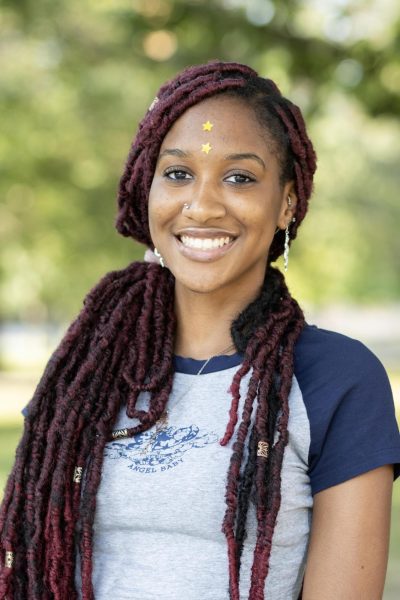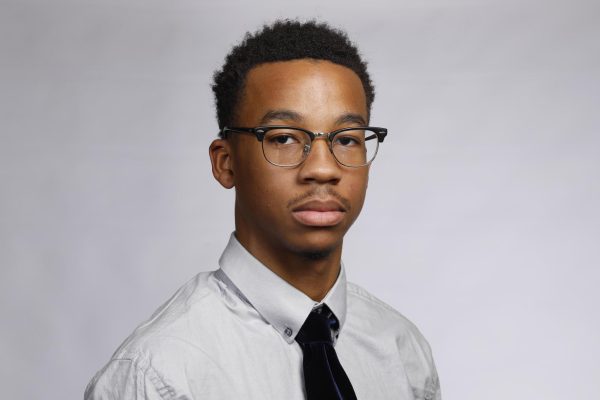EIU president comments on EIU-UPI strike, negotiations
University President David Glassman walks into the first bargaining meeting since EIU-UPI started picketing. This is the union’s second day of picketing for a fair contract.
April 11, 2023
University President David Glassman released a statement on the ongoing union strike by Eastern’s chapter of University Professionals of Illinois, EIU-UPI on Monday.
EIU-UPI have been on strike since Thursday after bargaining for a new contract with Eastern’s administration since March 21, 2022.
Eastern has a policy to minimally comment on ongoing negotiations. Glassman released a statement on the current issue that was around two-and-a-half pages.
Glassman said he felt it was time to comment on the negotiations.
“I felt it was time for me, as president of the university, to present some thoughts about our labor negotiations with our UPI partners as well as the strike that began last Thursday, April 6,” Glassman said. “Some are facts that are borne out of data that can be viewed, others reflect actions that I have been personally involved in, and others reflect what I truly do believe to be the case for both EIU management and UPI members.”
Glassman said the administration has been bargaining for a fair contract during negotiations, which can be “complex, highly emotional, and prolonged.”
Glassman said the message by EIU-UPI and other unions may attempt to vilify management during a negotiation period.
“The messaging of the labor union may attempt to vilify management by suggesting management doesn’t care about them or is unwilling to provide a fair agreement, that they delay the negotiations, that they walk away from the table, that they are hoarding funds, etc.,” Glassman said.
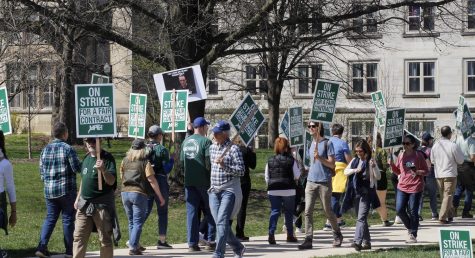
Glassman listed four things he believed to be the case for Eastern’s administration and EIU-UPI members.
- Both have a great love for students, Eastern and the local community.
- Both agree Eastern has made strides following the state budget impasses and increasing student enrollment leading to financial stability for Eastern.
- Both want the strike to end as soon as possible.
- “Both EIU administration and UPI members respect one another and have had an excellent working relationship over the past many years.”
Glassman followed this list with the question, “Well, if that is true, why did a strike happen and why has an agreement yet to be achieved?”
Glassman said the current issues being negotiated revolve around the different ideas of what a fair agreement would be especially for economic issues.
Glassman commented on additional issues from his side about the administrative negotiation team and the administration.
First, Glassman said Eastern continues to and has fairly bargained since the beginning of the negotiations.
In October, a grievance for not bargaining in good faith was delivered by EIU-UPI to Glassman’s office.
Second, Glassman said Eastern has been committed to remaining at the bargaining table as long as doing so is productive and has not provided a “final and last” offer to the UPI bargaining team.
“We are always willing to meet and keep the negotiations moving forward,” Glassman said. “The parties are scheduled to meet at 4 p.m. Tuesday, the earliest UPI was available to meet this week even though the EIU team offered to meet before that.”
However, EIU-UPI said they had offered to meet and negotiate Saturday which the federal mediator involved said would be too soon for administration to have any significant movements by then.
The mediator also advised that meeting Sunday or Monday would also potentially be too soon, so the union offered to meet Tuesday with a tentative meeting set for Wednesday as well.
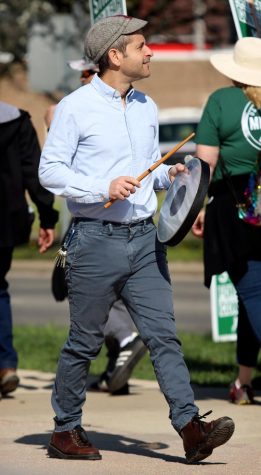
Third, Glassman listed the resolution of six non-economic issues made at Friday’s meeting as a show for significant progress despite what message the union has sent to the public.
EIU-UPI’s current across the board salary increase proposal for the next four years is 7 percent, 5 percent, 5 percent and 4 percent. Including the rest of EIU-UPI’s proposal package, this would cost over $9.3M, according to Glassman.
The university offer is currently at 3.75%, 3 percent, 3 percent and 2.25% with a total proposal cost of over $5.8M, according to Glassman.
This leaves an approximately over $3M difference between the proposals.
As to why not just give the union what they want, Glassman said the contract negotiations are not Eastern’s only priority.
“UPI leadership has said publicly that EIU has the funds to do so, it is just that the administration does not have their priorities correct,” Glassman said. “One only needs to realize that the union has only one priority to focus upon (and that’s what they should be doing), the benefits to their membership. In contrast, EIU does indeed want to provide reasonable compensation to our UPI partners, but we also want to provide available funds with our other outstanding employees; we want to rebuild staffing in the departments of facilities, business office, HR, procurement, advancement, university police, and others that were decimated during the budget impasse and have yet been provided the resources to rebuild.”
Glassman said Eastern wants to provide additional funds to a variety of sections. This includes $500M for deferred maintenance, increasing student financial aid, additional funds to hire additional faculty and staff, etc.
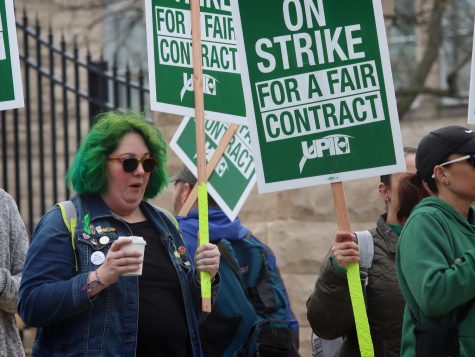
Glassman said Eastern’s administration has many high priorities and that all of them are important.
“There are simply not enough university funds to tackle all of these areas except through balancing the amount of dollars going to each priority,” Glassman said. “We absolutely value our faculty and academic support staff and will increase their salaries significantly—indeed our current offer does so more than the last several collective bargaining agreements—but we must also retain adequate funding for increasing our non-UPI employee salaries and keep our university structurally sound, beautiful, and operating efficiently.”
Glassman said Eastern needs to restore the cash reserves in preparation for potential future crises or declining enrollment.
Jennifer Stringfellow, the president of EIU-UPI and professor of special education, said Glassman’s side failed to include “key parts” of the story.
“We’re thrilled that President Glassman has finally taken an interest in the bargaining process 13 months after it started,” Stringfellow said. “However, it’s disappointing to read his depiction of priorities; he’s missing key parts of the full story.”
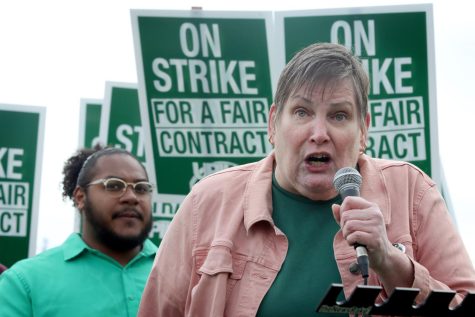
Stringfellow mentioned Glassman’s lack of mentioning the $15.4M gain Eastern received in between the fiscal years as one key part.
“What President Glassman did not dispute was the change in EIU’s net financial position by a gain of $15.4 million dollars from Fiscal Year 2022 to Fiscal Year 2023,” Stringfellow said. “The truth is that for the past five years, EIU has been on a steady trajectory of economic recovery. These gains were realized in part by the work of everyone on this campus, including our members. For example, over the course of eight years, our tenure track faculty have increased our overload work amount by 50 percent. Our faculty overload work is paid at a substantially lower rate than our regular wages (from 70 percent to less than 33 percent). As a result, our members have been doing extra work for less pay to save the university hundreds of thousands of dollars each year. In fact, EIU employees across campus and at all levels have been asked to do extra work, which is the result of many positions remaining unfilled. Balancing the operations of this university on the backs of overworked faculty and staff is not a sustainable approach to running an institution of higher education.”
Stringfellow said Glassman’s comments on financial priorities does not make sense to the EIU-UPI members.
“We are also not convinced that there is an urgency this year to set aside substantial amounts of the $15.4 million surplus to take care of re-staffing, campus maintenance, and wages for workers in other sectors of campus because EIU, under President Glassman’s leadership, has not actually implemented any of these priorities,” Stringfellow said. “Everyone who works at EIU knows that the raises have been low across all work sectors, except for President Glassman’s most recent 10 percent raise, and positions have been left vacant so that work is distributed to those who stay.”
Stringfellow said the administration lead negotiator, hired Chicago lawyer Mark Bennett, has been the source of problems as well.
“We question the effectiveness of President Glassman’s lead negotiator,” Stringfellow said. “When the leader of their bargaining team does not work here, does not live here, and does not even come here except to do his job as a retained outside counsel, we are skeptical that his decisions and strategies are in the best interest of the sustained culture of our campus and our community.”
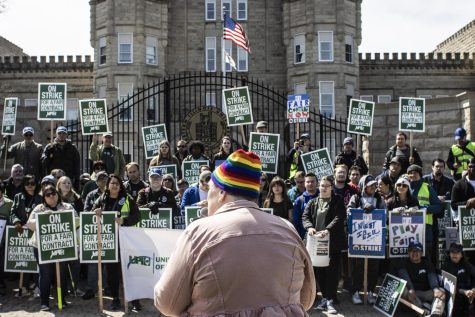
Stringfellow said the union’s priority is to build a stronger university, which has been done today based on faculty’s hard work.
“The stability we have today is built on our work and the sacrifices we’ve made along the way to support the institution during tough times,” Stringfellow said. “One would hope that, as enrollment continues to increase, the university would spend more on student-facing instructional expenses. While that number has remained the same over the course of the last few years, we’ve seen the expenditure for administration increase by $3 million. Explain that priority.”
Stringfellow said Glassman’s excuses are unacceptable.
“President Glassman’s explanation comes across as convenient excuses to continue the austerity economic approach at EIU at the expense of all of EIU workers,” Stringfellow said.
Stringfellow asked for Glassman, Provost Jay Gatrell and Board of Trustees Chairperson Joyce Madigan to work with EIU-UPI to reach an agreement and end the strike.
“This fight is about the sustainability of the human capital on our campus and about the learning environment for our students,” Stringfellow said. “So far, our students and community members have shown up to walk the strike line with faculty and staff every day. We will continue to do so until the administration offers a contract that adequately invests in the future of our campus.”
Glassman said for a resolution to end the strike, both negotiating teams need to compromise.
“For EIU and UPI to resolve our differences and end this strike, both parties will need to compromise and reach an agreement that is mutually beneficial – not just beneficial to one side,” Glassman said. “That will be the fairest solution for our UPI members, the university and its students at large.”
Madelyn Kidd can be reached at 581-2812 or at DENeic@gmail.com.


















![[Thumbnail Edition] Senior Foward Macy McGlone, getsw the ball and gets the point during the first half of the game aginst Western Illinois University,, Eastern Illinois University Lost to Western Illinois University Thursday March 6 20205, 78-75 EIU lost making it the end of their season](https://www.dailyeasternnews.com/wp-content/uploads/2025/03/WBB_OVC_03_O-1-e1743361637111-1200x614.jpg)













































